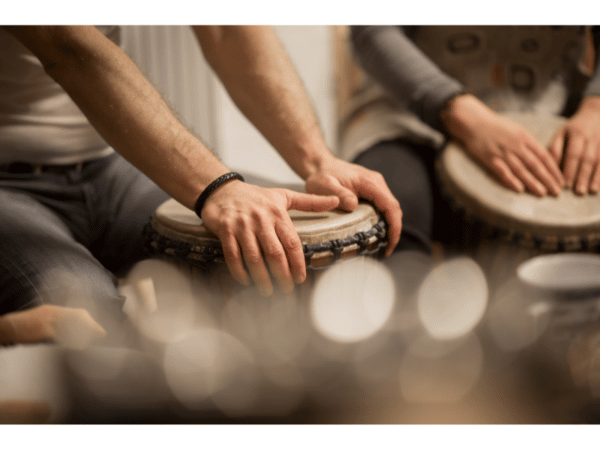
Music Therapy – The A To Z Of Allied Health
In this week’s edition of The A to Z of Allied Health, we focus on the music therapy profession. We’ll cover what a music therapist does, the areas in which they work, their educational requirements, and the regulatory frameworks that govern them.
Many of us have experienced the power that music can have on our health and wellbeing. Whether it is listening to music to make us feel calm, more energetic, or to help us with our running pace, music can have direct impacts on our minds, hearts and bodies. Singing or playing music on our own or in a group can help us feel more connected, return old memories and express thoughts and feelings we could not relate with words.
Music therapists harness this power to improve health and wellbeing. Sometimes singing or listening to music is all we need to stay calm, relax or indeed exercise and stay fit. But when our physical, emotional or social needs are more complex, it is an RMT’s advanced skills and expertise that are often required.
What does a music therapist do?
Music therapists are unique allied health professionals who use music to help people of all ages to improve their health, wellbeing, and function. Music therapists are skilled musicians, who are trained to understand the effects therapeutic music experiences can  have on our bodies, behaviours, feelings, thoughts and actions. They provide tailored, evidence-based therapy to the people they work with and aim to support and improve their mental and physical health, and their quality of life.
have on our bodies, behaviours, feelings, thoughts and actions. They provide tailored, evidence-based therapy to the people they work with and aim to support and improve their mental and physical health, and their quality of life.
Music therapy uses a range of interactive and therapeutic musical approaches and experiences to help people achieve their goals. These goals may include improved communication, cognition, physical function, mood, wellbeing, and spiritual goals.
Music Therapists work within multidisciplinary teams with people living with a range of health conditions, including acquired brain injury, autism, attention hyperactivity disorder, anxiety, cancer, chronic pain, disability, depression, dementia, post-traumatic stress disorder, and neurodegenerative conditions.
Some of the techniques music therapists use include using music (live or pre-recorded) for the people they work with, and making music, writing lyrics and songs with people, and other speciality techniques.
Where do music therapists work?
Music Therapists work in many countries across the world. The World Federation of Music Therapy is an international network of music therapy practitioners, educators, and researchers across eight broad regions encompassing Africa, Australia/New Zealand, Eastern Mediterranean, Europe, Latin America, North America, Southeast Asia, and the Western Pacific. National music therapy associations work together via the World Federation of Music Therapy to share information and research, promote international collaboration and advocate for the profession.
Music Therapists work in a range of settings, including hospitals (from neonatal intensive care to older person’s mental health units), schools, rehabilitation facilities, residential aged care facilities, palliative care, community health, private practice, childcare centres, disability services, detention centres and prisons. They often work as part of a multidisciplinary or transdisciplinary team. Some work in 9 to 5 positions in healthcare or education settings, others work in in part time roles across several settings, and many work in private practice as small business owners.
What personal qualities would make me ideally suited to become a music therapist?
In addition to their advanced musical ability and knowledge in ground-breaking research, theory and clinical practice, music therapists will often exhibit a number of personal and relational attributes. Music therapists are typically flexible, open minded and authentic individuals with a strong sense of self-awareness and personal boundaries.
They are creative and empathetic, demonstrate respect for their colleagues and clients, and are focused on fostering trust, independence and empowerment.
How do I become a music therapist?
 In Australia, the UK, and New Zealand, music therapists attain their qualifications through postgraduate university education. Prospective music therapy students must have an undergraduate qualification in music or in education, psychology, or another health-related discipline, provided they can demonstrate high level musical skills.
In Australia, the UK, and New Zealand, music therapists attain their qualifications through postgraduate university education. Prospective music therapy students must have an undergraduate qualification in music or in education, psychology, or another health-related discipline, provided they can demonstrate high level musical skills.
Australian Registered Music Therapists (RMTs) have graduated with Masters-level qualifications in an accredited course (including over 600 hours of supervised professional practice) and must be registered with the Australian Music Therapy Association. Australian RMTs graduate with high-level research skills and contribute to the national and international research at a high rate per capita.
In Canada, the education and credentialing system for music therapists requires the completion of a Bachelor of Music Therapy at a Canadian Association of Music Therapists-approved institution, 1000 hours of supervised clinical practice through an internship, and a pass in the Music Therapists examination.
In the USA, aspiring music therapists must have demonstrated musical skills and can undertake an undergraduate or graduate education program. The undergraduate course is delivered as internship-style education, which includes undergraduate study of music therapy units, and clinical practice training in an approved setting. Graduate programs require students undertake the music therapy specific units that are offered in the undergraduate program. Graduate programs may include a research element.
In New Zealand, you’ll be required to complete a Masters of Music Therapy course or overseas equivalent. You’ll need to be registered with the Music Therapy New Zealand Registration Board, and hold a current practicing certificate based on an annual review and supervision.
Music therapists are self-regulated in Australia, the UK, Canada, the USA, and New Zealand. However, in Canada, the recent changes to the government regulation of psychotherapy and counselling is beginning to impact music therapy.
In Australia, the Australian Music Therapy Association is a member of the National Association of Self-Regulated Health Professions (NASRHP). As such, RMTs must comply with benchmark regulatory and accreditation standards. This is intended to assure consumers they are receiving safe and quality services from a certified and registered music therapist.
Music therapy workforce considerations
Music therapy is a small allied health profession and deemed to be under-utilised in several settings where people stand to benefit from this form of therapy (e.g., aged care, disability and mental health settings). Due to increasing demand for music therapy, there is pressure on the available workforce. There is sufficient demand to warrant additional university places for music therapy. Advocacy for the music therapy profession and the population groups that stand to benefit from music therapy is a key priority for Music Therapy Associations internationally.
Find out more about music therapy
Here are some links to websites and resources for and about music therapists:
- Australian Music Therapy Association
- British Association for Music Therapy
- Music therapist – HEIW (nhs.wales)
- Canadian Association of Music Therapists
- American Music Therapy Association
- Music Therapy New Zealand
If you have questions about the music therapy profession, or if you wish to share your experiences as a music therapist, please leave a comment below.
Subscribe to Allied Health Insights to receive incisive and up-to-date allied health commentary and solutions. | Browse our range of insights into the allied health professions here.
If you offer professional development or business support services for music therapists or their employers, please list your business on our Service Directory.
AHP Workforce provides music therapist workforce planning, strategy and consulting for employers, managers and public sector stakeholders. For allied health workforce solutions, contact us today.





